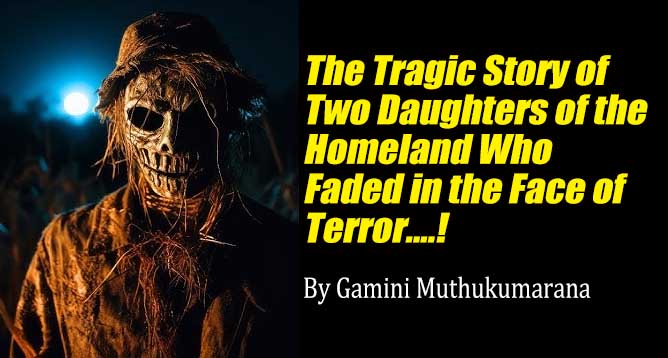-By: Gamini Muthukumarana

(Lanka-e-News -13.Nov.2024, 11.25 pm) They were the offspring of a brave generation who took the lead in fighting poverty in Sri Lanka. They sowed seeds of new ideas, ideologies, and fresh hopes on Lankan soil, standing united against the oppression spreading across the country. These were people who awakened early, fighting for those condemned to hunger and malnutrition. In an era when many called for change in the policies that were economically devastating the nation, some corrupt politicians still misrepresent the history of the Janatha Vimukthi Peramuna (JVP) and the events of 1988-89 to conceal the truth.
It was the United National Party (UNP) that dragged the country into a civil war... The UNP, which came to power in 1977 under J.R. Jayewardene, undermined democracy with executive powers, eventually plunging the entire country into a civil conflict from 1987 to 1989. In July 1983, without any justifiable reason, the government banned the JVP, sparking flames that destroyed Tamil-owned businesses in and around Colombo. July 1983, infamous for racial violence, sowed deep suspicion and fear between Sinhalese and Tamil communities. It was the UNP that fanned the flames of a civil war, pushing the entire nation towards bankruptcy.
In their democratic struggle, the JVP was not only banned but also faced a brutal suppression across the country, with orders issued to arrest its leaders. The UNP’s American-aligned leadership, under J.R., ultimately brought the nation face-to-face with an Indian invasion, sparking a patriotic movement that opposed both the invading Indian forces and the domestic oppressive regime. Despite the JVP's ban, its members fulfilled their duty to the country by resisting the oppressive UNP rule. They understood that lasting freedom could only be achieved by ending tyrannical rule, and they made every possible sacrifice.
They Were Heroes of the Rainy Season…
There are countless tales about the thousands who sacrificed their lives in these difficult times. Although many are aware of the brothers who fought, there is rarely any talk of the sisters. From the first JVP uprising against the state in 1971 to the state repression of 1987-90, these fearless sisters fought alongside their brothers. This brief account remembers two such beloved sisters who gave their lives in the history of the JVP.
"It’s dangerous for you both to travel together. Go separately wherever you need to go."
This was the advice given in late 1988 by a JVP district secretary to two sisters, Manori and Aruni.
Manori, also known as Swarnalatha from Dodamgaslanda, was a student at Ruhuna University. She was introduced to JVP politics in her school days, influenced by her elder brother Sumanadasa, who was also involved with the JVP and remains active with the party to this day. Manori, the fifth among eight siblings, joined the JVP’s political activities in the Galle district after a party request.
Known as Aruni, she was Chamini Geethanjali from Hiniduma Talangalla. She joined the JVP while pursuing her A-levels at Sangamiththa School in Galle. Coming from a poor family with six children, Aruni was the eldest daughter, and her younger siblings included a sister and four brothers. Like Manori, Aruni joined the JVP’s political activities to fight for the country’s true freedom.
One afternoon, Manori and Aruni went to Karapitiya Hospital for a medical check-up. Though the party had advised them not to travel together for safety, they disregarded the warning, unaware of the impending tragedy. As they left the hospital and took a small side path to Godekanda, they were unaware that a military vehicle had been following them, waiting for the right moment. Soldiers suddenly surrounded them and forcefully pulled them into the vehicle.
The vehicle took them to Kotigala Camp, where Colonel Lucky Algama oversaw a brutal torture chamber. A month later, a surviving sister recounted their ordeal to us, describing horrific physical and sexual abuse. Their bodies, tied together by their hair, were later found washed ashore on the Unawatuna beach. After enduring such atrocities, they were murdered and abandoned at sea. Many sisters taken to these torture camps faced the same tragic fate.
For the first time in history, a traitorous government has been defeated. Now, a new form of governance is emerging under the leadership of the party’s leader, who once fought alongside these fallen heroes. The challenge of rebuilding a devastated nation within a few years is significant, and we must approach it with a positive outlook.
The tragic memories of our brothers and sisters who faced such brutalities should be revealed to the current society. Fifty years after the murder of Chile’s President Salvador Allende by General Augusto Pinochet, justice was finally served as many executioners were convicted and imprisoned.
The painful memories of the brothers and sisters who faced such bitter fates can never be fully expressed. History shows us that no matter how many lives are taken, spring will come again. As Chairman Mao Zedong once said:
"A commander can destroy all the roses, but he cannot prevent the arrival of spring." - Mao Zedong
---------------------------
by (2024-11-13 22:15:48)
Leave a Reply